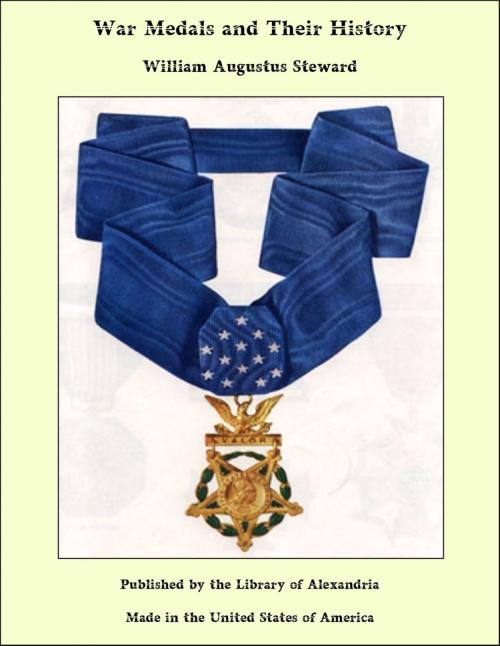War Medals and Their History
Nonfiction, Religion & Spirituality, New Age, History, Fiction & Literature| Author: | William Augustus Steward | ISBN: | 9781465617286 |
| Publisher: | Library of Alexandria | Publication: | March 8, 2015 |
| Imprint: | Language: | English |
| Author: | William Augustus Steward |
| ISBN: | 9781465617286 |
| Publisher: | Library of Alexandria |
| Publication: | March 8, 2015 |
| Imprint: | |
| Language: | English |
Since the days when woad-clad Britons faced Cæsar's legions we have had a military system, but it was not, so far as we have any substantial evidence, until the days of Elizabeth that personal decorations were awarded for military service, or distinction on the seas or in the field. In the Middle Ages, a warrior, knighted on the field of battle, was permitted to use a square instead of a swallow-tailed pennon, as a knight's banneret, and to use a war cry, from whence we may trace the origin of the mottoes used with Coats of Arms. Later, after Sedgemoor (July 6th, 1685), recognition of the lower ranks is recorded in the bestowal of a gratuity of £40 to Sergeant Weems of the 1st Royals (now the Royal Scots) for serving the great guns in an emergency; but these types of award hardly provided that personal note or record which the war medal, as we know it, gives to the recipient. It is fitting that the Navy, which had existed for centuries prior to the establishment of a standing Army, should take precedence in the bestowal of awards for active service; the rout of the Spanish Armada—in 1588—probably gave the incentive to Good Queen Bess to commemorate the auspicious occasion by the issue of medals in gold and silver, and we may reasonably assume that they were given for personal decoration to the leading officers engaged in the defeat of the Armada, or that the recipients thought that by wearing them they would show respect to the Queen, and thus established the custom of wearing medals, presented by the Sovereign for War Service. A specimen of these medals, with rings and chain for suspension, probably from the neck, is to be seen in the British Museum. Just over fifty years later, Charles I established the principle for the Army, and thus strengthened the precedent, which was gradually extended, until now every boy and man who has acquitted himself creditably in a campaign, and the nurses also, may rightly claim the medallic recognition and record of their principal services by land or by sea.
Since the days when woad-clad Britons faced Cæsar's legions we have had a military system, but it was not, so far as we have any substantial evidence, until the days of Elizabeth that personal decorations were awarded for military service, or distinction on the seas or in the field. In the Middle Ages, a warrior, knighted on the field of battle, was permitted to use a square instead of a swallow-tailed pennon, as a knight's banneret, and to use a war cry, from whence we may trace the origin of the mottoes used with Coats of Arms. Later, after Sedgemoor (July 6th, 1685), recognition of the lower ranks is recorded in the bestowal of a gratuity of £40 to Sergeant Weems of the 1st Royals (now the Royal Scots) for serving the great guns in an emergency; but these types of award hardly provided that personal note or record which the war medal, as we know it, gives to the recipient. It is fitting that the Navy, which had existed for centuries prior to the establishment of a standing Army, should take precedence in the bestowal of awards for active service; the rout of the Spanish Armada—in 1588—probably gave the incentive to Good Queen Bess to commemorate the auspicious occasion by the issue of medals in gold and silver, and we may reasonably assume that they were given for personal decoration to the leading officers engaged in the defeat of the Armada, or that the recipients thought that by wearing them they would show respect to the Queen, and thus established the custom of wearing medals, presented by the Sovereign for War Service. A specimen of these medals, with rings and chain for suspension, probably from the neck, is to be seen in the British Museum. Just over fifty years later, Charles I established the principle for the Army, and thus strengthened the precedent, which was gradually extended, until now every boy and man who has acquitted himself creditably in a campaign, and the nurses also, may rightly claim the medallic recognition and record of their principal services by land or by sea.















